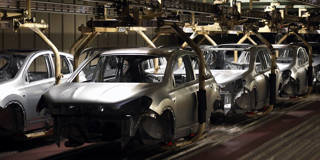Economists have always believed that previous waves of job destruction led to an equilibrium between supply and demand in the labor market at a higher level of both employment and earnings. But if robots can actually replace, not just displace, humans, it is hard to see an equilibrium point until the human race itself becomes redundant.
LONDON – Dispelling anxiety about robots has become a major preoccupation of business apologetics. The commonsense – and far from foolish – view is that the more jobs are automated, the fewer there will be for humans to perform. The headline example is the driverless car. If cars can drive themselves, what will happen to chauffeurs, taxi drivers, and so on?
Economic theory tells us that our worries are groundless. Attaching machines to workers increases their output for each hour they work. They then have an enviable choice: work less for the same wage as before, or work the same number of hours for more pay. And as the cost of existing goods falls, consumers will have more money to spend on more of the same goods or different ones. Either way, there is no reason to expect a net loss of human jobs – or anything but continual improvements in living standards.
History suggests as much. For the last 200 years or so, productivity has been steadily rising, especially in the West. The people who live in the West have chosen both more leisure and higher income. Hours of work in rich countries have halved since 1870, while real per capita income has risen by a factor of five.

LONDON – Dispelling anxiety about robots has become a major preoccupation of business apologetics. The commonsense – and far from foolish – view is that the more jobs are automated, the fewer there will be for humans to perform. The headline example is the driverless car. If cars can drive themselves, what will happen to chauffeurs, taxi drivers, and so on?
Economic theory tells us that our worries are groundless. Attaching machines to workers increases their output for each hour they work. They then have an enviable choice: work less for the same wage as before, or work the same number of hours for more pay. And as the cost of existing goods falls, consumers will have more money to spend on more of the same goods or different ones. Either way, there is no reason to expect a net loss of human jobs – or anything but continual improvements in living standards.
History suggests as much. For the last 200 years or so, productivity has been steadily rising, especially in the West. The people who live in the West have chosen both more leisure and higher income. Hours of work in rich countries have halved since 1870, while real per capita income has risen by a factor of five.